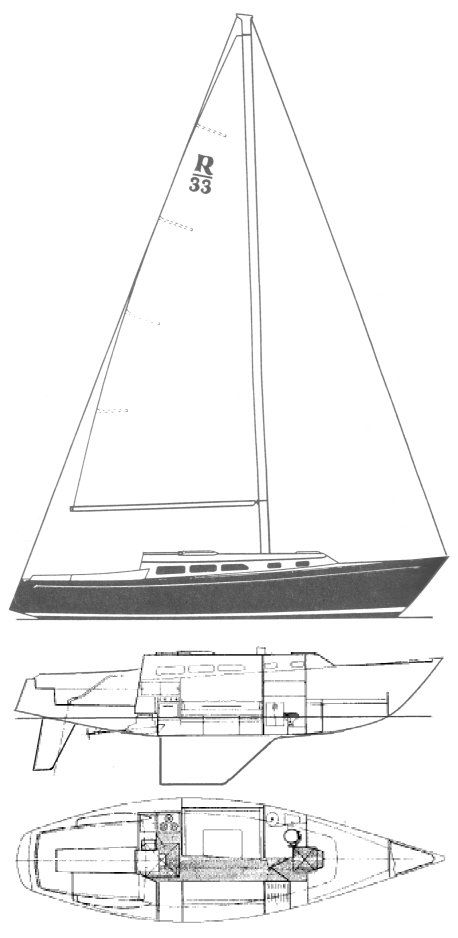The Ranger 33 stands as a testament to the era of spirited performance cruisers, embodying a design philosophy that successfully blended speed with comfortable accommodations. Launched in 1969 and produced until 1978 by Ranger Yachts, a division founded by marine industry veteran Jack Jensen, this sailboat quickly gained a reputation as a versatile and competitive vessel. Designed by the acclaimed American naval architect Gary Mull, the Ranger 33 represents Mull's commitment to creating robust, light-displacement yachts that offer an engaging sailing experience for both racers and coastal cruisers.
Ranger 33 Information, Review, Specs

- Make
- Model
- Number Built
- 464
- Production Year(s)
- 1969 - 1978
The genesis of the Ranger 33 began in 1969, marking a significant entry into the market for Ranger Yachts, which aimed to establish a strong presence on the East Coast of the USA. Over its production run, which concluded in 1978, a notable 464 units of the Ranger 33 were built. The design itself was a product of Gary Mull's distinctive approach, emphasizing light displacement coupled with sturdy construction, a hallmark of the Ranger brand's ethos during this period. Mull's philosophy sought to deliver a compelling combination of speed and seaworthiness, appealing to sailors who valued both spirited performance and practical cruising capabilities.
Characteristic of designs from its time, the Ranger 33 features a modern split underbody with a fin keel and a spade rudder, along with a reverse transom and 'midships beam, reflecting the prevailing International Offshore Rule (IOR) influences. While no distinct "Mark I" or "Mark II" designations were widely adopted for the Ranger 33, the production run saw some evolution. Later models, for instance, offered wheel steering as standard and introduced a Universal diesel engine as an alternative to the original Universal-Atomic 4 gasoline engine. Additionally, a shorter rig was available alongside the standard masthead sloop configuration.
Sailing Performance and Handling
The Ranger 33 is widely recognized as a performance boat, capable of holding its own in club racing while still being well-suited for coastal cruising. Its design ratios underscore this balance. With a Sail Area to Displacement (SA/D) ratio of approximately 17.62, the Ranger 33 demonstrates moderate light-air performance, suggesting it can move well in lighter conditions without being overly sensitive.
The Ballast to Displacement (B/D) ratio, calculated at around 0.428, indicates good inherent stiffness and stability, allowing the boat to stand up to a breeze and rarely heel excessively. This contributes to a comfortable motion even in a seaway. The Displacement to Length (D/L) ratio of roughly 259.18 places the Ranger 33 in the medium displacement category, reinforcing its reputation as a reasonably good performer with a balanced feel. Owners often praise its seaworthy, seakindly, and responsive handling characteristics, noting its consistent power delivery and ease of management.
Accommodations and Layout
While the detailed interior specifications in the provided data are limited, the Ranger 33 was designed with practical cruising in mind, offering a standard layout capable of sleeping six individuals. Headroom within the main cabin is noted to be approximately 6 feet 2 inches, providing comfortable standing room for most sailors.
Typical interior arrangements for boats of this size and era usually include a V-berth forward, a marine head, a main salon with settees that can convert to berths, a galley area, and often quarter berths aft. The finish quality generally features a combination of fiberglass surfaces and wood trim, providing a classic yacht aesthetic. Storage options are usually ample for coastal cruising, including lockers and shelving. Ventilation is typically achieved through deck hatches and opening ports, although specifics on the number and placement of these would vary by individual boat and year of manufacture. The flooring often consists of non-slip fiberglass or faux teak foam.
Owner's Perspectives
Owners of the Ranger 33 frequently commend its robust construction and its ability to deliver a comfortable motion in various sea states, a direct benefit of its balanced design. Many appreciate its versatility, highlighting its capacity for both enjoyable club racing and comfortable family cruising. The boat's responsive handling and solid performance are consistently cited as significant strengths.
However, some common maintenance issues have been noted over the years. A recurring concern among owners, particularly for pre-1975 models, is the tendency for the hull-to-deck joint to develop leaks. Similarly, the original ports may also be prone to leaking, often requiring re-bedding to ensure watertight integrity. While generally considered well-built, some owners have reported issues like blistering in the hull, and isolated instances of flexing problems or mast support concerns have been raised in owner forums. Despite these potential older boat issues, the enduring appeal of the Ranger 33 is evident in the active community of owners who continue to sail and maintain these classic Gary Mull designs.
Measurements
Construction & Hull
- Construction Material
- Fiberglass (Solid)
- Hull Type
- Monohull Sailboat
- Keel Type
- Fin
- Rudder
- 1x Spade
- Ballast
- 4500 lbs (Lead)
- Displacement
- 10500 lbs
- Water Capacity
- 21 gal
- Fuel Capacity
- 21 gal
Engine
- Engine Make
- Universal-Atomic
- Engine Model
- Atomic 4
- Engine Type
- —
- Engine HP
- 30
- Engine Count
- 1
- Drive Type
- —
- Fuel Type
- Gasoline
Rig & Sails
- Rig Type
- Masthead Sloop
- P (Main Luff)
- 35 ft
- E (Main Foot)
- 13.75 ft
- I (Foretriangle Height)
- 41.5 ft
- J (Foretriangle Base)
- 13.87 ft
- Forestay Length (est)
- 43.76 ft
- Main Sail Area
- 240.63 sqft
- Foretriangle Sail Area
- 287.8 sqft
- Total Sail Area (Reported)
- 529 sqft
- Total Sail Area (Calc)
- 528.43 sqft
Dimensions
- LOA
- 33.17 ft
- LWL
- 26.25 ft
- Beam
- 9.58 ft
- Draft
- 5 ft
- Max Headroom
- -
- Air Draft
- -
Calculations
- Hull Speed
- 6.87 kn
- Pounds per Inch Immersion
- 898.55